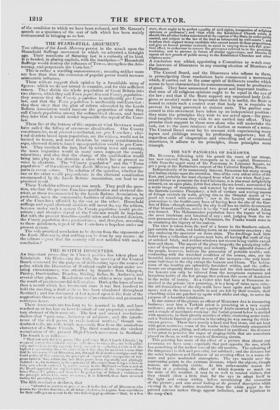THE NEW PANORAMA OF DAMASCUS.
Mn. Bueeono, following with his pencil the route of our troops, has now entered Syria, and transports us to its capital, Damascus; while from the upper story of his Panorama in Leicester Square, we get a peep at the Barbarian's outport of the Celestial Empire, Macao. Independently of its momentary interest, Damascus has many strong Independently of its momentary interest, Damascus has many strong
and lasting claims upon the attention. One of the very oldest cities ofthe East, and probably the least changed from what it was when Saul jour- neyed thither to persecute the first Christians, it is also most delightfully situated, on an open plain, 2,000 feet above the sea-level ; surrounded by a noble range of mountains; and watered by the numerous streams of the Barrada (ancient Pharphar): a belt of verdure and waving masses of foliage encircle its walls, giving rise to the Oriental simile of " a pearl set round with emeralds" ; nor is the locality without some pretensions to the traditionary fame of having been the site of the Gar- den of Eden—though assuredly the city itself has no visible denotement of that blessed condition, unless it be the "red earth" of which Adam was formed. The Mahommedan population have the repute of being the most intolerant and fanatical of any ; and, judging from the re- cent persecutions of the Jews by Christians, the Franks would seem to be emulating the bigotry of the natives.
The view is taken from the roof of a house in the Southern suburb, just outside the walls, zmd looking down on an extensive cemetery ; the
city enclosing the spectator on three sides. The dwellings look little better than a collection of square mud huts, all having flat roofs of clay or unbaked brick, and neither windows nor streets being visible except here and there. The aspect of the place bespeaks the paralyzing influ- ence of despotism on prosperity and industry. The splendid dresses of the people, however, indicate the possession of portable wealth; and, contrasting with the wretched condition of the houses, also, are the beautiful minarets andlstately domes of the mosques—the only hand- some buildings in the city except the bazaars and khans. The habita- tions of the wealthy are splendidly furnished within, and the coffee- houses are elegantly fitted up ; but these and the rich merchandise of the bazaars can only be inferred from the sumptuous costumes and luxurious habits of the few groups that enliven this scene of desolation in the midst of beauty. As a visiter who had been at Damascus re- marked at the private view yesterday, it is a heap of ruins upon ruins : the old foundations of the city-walls have been agaiu and again built upon ; and as the houses tumble in and are left by their tenants, their crumbling sides are patched up again with sticks and clay, to serve the purpose of a humbler inhabitant.
In one corner of the picture an oflicer of MetilnIET Am is transacting
business; near him a Turkish priest is presetting to a very scanty audience; and a little way off are a party of Arabs escorted by a soldier, and a couple of' merchants sn:oking : the burial-ground below is studded with mourners, in their ghostly mantles of white, clustering under tents; and a Turkish funeral-procession is threading its way among the thick- strewn graves. These have mostly a head and foot stone, and are kept with great neatness; some of the tombs being elaborately ornamented with painting and gilding, and others enclosed in pavilions: the distance is too great to perceive the cages at singing-birds that are sometimes placed on them, as well as vessels of' flowering shrubs. This painting has more of the efThet of a picture than almost any panorama we have seen ; especially that part opposite the stm, which has something of' the mellow tone of the old masters. The colouring of the foreground is rich and powerful, but subdued ; and the distance has the sober brightness and freshness of an evening effect in a warm cli- mate and pure unclouded atmosphere. The eye travels over the intervening points to the extreme distance, where the objects, though remote, are distinctly visible. At this unfavourable season for , looking at a painting, the effect of which depends so much on . the state of the weather, it may be as well to remind visitors, that they should allow a little time for the eye to adapt itself to the light and colour within, before scrutinizing the executmn of the picture ; and also avoid looking at the printed description while viewing it, as the sudden transition from the white paper to the
painted canvass makes things appear indistinct, and is injurious to the coup d'eell.


























 Previous page
Previous page